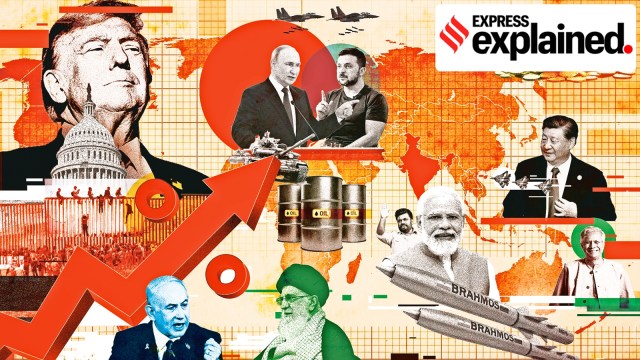Two ongoing wars, regime changes in India’s neighbourhood and in West Asia, and a phenomenal return to the United States presidency by Donald Trump in 2024 foretell a fascinating 2025 geopolitically. Trump is the biggest X-factor as seat belts are fastened in world capitals in anticipation of a roller coaster ride for the next four years.

On the last day of 2024, here are the hard realities from the year gone by, and the opportunities and challenges that the new year will likely present.
THE HARD REALITIES
Donald Trump 2.0
The most consequential election in the world returned Trump to the office he left early in 2021. American Presidents usually get back-to-back terms, with no opportunity to see the impact and consequences of the first four years from outside the Oval Office.
Trump has come back after a break, more confident and possibly wiser — and has announced nominees for all key appointments long before inauguration day on January 20. His declared intentions of ending ongoing wars and imposing steep tariffs on trade rivals of the US have piqued curiosity and anxiety in many countries.
India’s neighbourhood
Important countries in India’s neighbourhood got new governments in 2024.
Story continues below this ad
BANGLADESH: Weeks of sustained street protests drove Sheikh Hasina from power after 16 years, and forced her to flee to India. The new establishment under Chief Adviser Muhammad Yunus has asked New Delhi to send her back, even as his interim government itself faces heat on the struggling economy, and for failing to protect religious minorities in Bangladesh.
SRI LANKA: The leftist politician Anura Kumara Dissanayake, who does not belong either to the traditional mainstream parties or the political elite that has ruled Sri Lanka from the beginning, was propelled to the presidency by mass disaffection that had brought down the government of Gotabaya Rajapaksa in 2022. The way the new President deals with the political aspirations of the Tamil minority will be important.
MALDIVES: Almost a year after Mohamed Muizzu came to power on an anti-India plank, New Delhi was able to secure a visit — and some positive signalling — from him in early October 2024.
NEPAL: K P Sharma Oli, whose pro-China stand has not been comforting to India, became Prime Minister for the fourth time in July. His alliance with Sher Bahadur Deuba’s Nepali Congress, however, has had a calming influence.
SEVERAL UNCERTAINTIES
The war in Ukraine
Story continues below this ad
President Volodymyr Zelenskyy has indicated that he is ready for talks with Russia, but as the war nears the end of three years, the possible terms of engagement with President Putin remain unclear.
The cost of peace will be the big question and the key challenge that negotiators from the US, Russia, Ukraine, and Europe must engage with. China will have a say in the negotiations, and India could play an important role as a neutral venue or a go-between among the Russians and the US-led West.
But New Delhi will evaluate whether it does want to play a role, what it can bring to the table that others can’t, and what happens if it doesn’t succeed. Putin’s visit to India for the annual summit will be watched closely.
With China, reasons for hope
After the breakthrough in the disengagement process, New Delhi and Beijing have signalled they are discussing both border issues and other steps to normalise ties impacted by almost five years of the standoff in Ladakh. Some 50,000-60,000 troops continue to be deployed along the border, and a drawdown could happen in the summer of 2025.
Story continues below this ad
India will be closely watching the next steps of de-escalation and de-induction of troops before it yields on the economic and visa restrictions that it has placed on Chinese businesses. Much will depend on whether Beijing keeps its end of the de-escalation bargain, and whether Indian soldiers are indeed able to patrol till the pre-2020 patrolling points, and local villagers can access their traditional grazing grounds.
The trust deficit remains high, and it will take a long time and a lot of effort to repair the damage. Prime Minister Modi’s possible visit to China for the SCO summit will be key to the effort. Before that, Modi might meet with President Xi Jinping at the BRICS summit in Brazil in July.
No engagement with Pak
The doctrine of indifference towards Pakistan continues, with India not agreeing to play cricket in that country. The public rhetoric has been muted, but bilateral engagements have not picked up yet.
Bangladesh’s Yunus has suggested a revival of SAARC, but the idea seems to be a non-starter. New Delhi is firm that talks and terror cannot go together, and the attacks in the Jammu region have reinforced that red line.
New leaders in Europe
Story continues below this ad
There will be fresh elections in Germany in 2025, France is battling with political instability, and the rise of the far right will not be reversed — it could be only a matter of time before these groups come to power in both countries.
The increasingly shrill debate on immigration will cast a shadow on Indians and others looking to study, live, and work in Europe. This issue is likely to come up as India and Europe negotiate a free trade pact.
The United Kingdom, which took a strong position on immigration under the Conservative government, is also negotiating a trade pact with India, and it will be interesting to see whether the sticking points are addressed by the British negotiators. An India-EU summit is in the works as well.
Africa: push for engagement
Story continues below this ad
An engagement with Africa may be a new area in Indian foreign policy this year, and both sides have been trying to find a mutually convenient schedule for it. There is some talk of hosting the summit in Ethiopia this year.
The 2015 summit in New Delhi, in which 40 heads of state and government from Africa participated, had been a major success. PM Modi is expected to travel to South Africa for the G20 leaders’ summit this year.
India-US, India-Canada
The assassination of Khalistani separatist Hardeep Singh Nijjar, in which Canada has accused India, has severely damaged ties, and complicated some aspects of the relationships with the US as well.
While India’s response to the US has been different from the way it has reacted to Canada, allegations of plotting a transnational extra-judicial killing has raised questions on India’s commitment to the rules-based order.
Story continues below this ad
The alleged plot targeting Gurpatwant Singh Pannun in the US also has a reputational cost for India’s global image, and for the many supporters of Indian democracy in the West, especially those who see India positively vis-à-vis authoritarian China. That is a question that New Delhi will have to answer, and assuage concerns across Western capitals.
Shubhajit Roy is Diplomatic Editor, The Indian Express
NEXT: SPORT








































